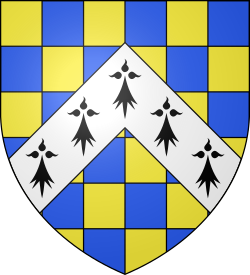Waleran de Beaumont, 4th Earl of Warwick facts for kids
Quick facts for kids
Waleran de Newburgh or Beaumont
|
|
|---|---|
| 4th Earl of Warwick | |

Coat of arms of the Earls of Warwick
|
|
| Died | 24 December 1204 |
| Noble family | Newburgh or Beaumont |
| Spouse(s) | Margaret de Bohun Alice de Harcourt |
| Issue | Henry de Beaumont, 5th Earl of Warwick Gundreda of Warwick Waleran of Warwick Alice of Warwick William fitz Count (illegitimate) |
| Father | Earl Roger of Warwick |
| Mother | Gundreda de Warenne, countess of Warwick |
Waleran de Beaumont, 4th Earl of Warwick (died 12 December 1204) was an important English nobleman. He was the second son of Earl Roger of Warwick and Gundreda de Warenne. Waleran became the Earl of Warwick after his older brother, William, passed away. He was known for being a clever leader and for helping his family's standing.
Contents
Early Life and Family History
Who Was Waleran de Beaumont?
Waleran was born sometime between 1137 and 1141. He was named after his father's cousin, Waleran II of Meulan. This cousin was a powerful friend of King Stephen of England. Waleran served as a knight in his older brother William's household. He also inherited lands in Rutland, including Greetham and Cottesmore.
Family Names: Beaumont and Newburgh
The family used the names 'Beaumont' and 'Newburgh'. Waleran was sometimes called 'Waleran of Warwick'. This shows how the family's name changed over time. These names are still used today to describe his family.
Becoming the Earl of Warwick
Taking on the Earldom
Waleran became the Earl of Warwick in 1184. His older brother, William, had no children and passed away. William left Waleran with many debts and less land than before. Despite these challenges, Waleran became quite successful in politics.
Serving the King
Waleran gained influence at the royal court. He carried a special sword, called a Sword of State, at the coronations of two kings. These were King Richard I and King John. This was a great honor. He also managed to get back a special payment from King Richard. This payment was a share of the profits from Warwickshire. His brother had lost this payment earlier.
Supporting the Crown
Waleran was a very loyal supporter of the king. He stood by King Richard during a difficult time. This was when King John rebelled against the king's officials in 1193-94. Waleran also tried to improve his family's wealth. He began selling parts of the forest of Sutton to local landowners. This area was a large part of northern Warwickshire at the time.
Helping the Community
Waleran was known for being generous. He supported the hospital of St Michael's Hospital, Warwick. He also gave money and land to several religious houses. He made a special gift to the nuns of Pinley at Claverdon. This was when his daughter Gundreda and niece Isabel went there for their education.
Waleran and the Legend of Guy of Warwick
A Special Marriage for His Son
Waleran arranged an important marriage for his oldest son, Henry. In 1204, Henry married Margaret d'Oilly. She was the daughter of a leading baron from Oxfordshire. This marriage was a big deal for the family.
The Story of Guy of Warwick
Some people think this marriage might have inspired a famous story. It's called the romance of Guy of Warwick. This legendary hero was an Oxfordshire baron. In the story, he marries the heiress of Warwick. Guy was later linked to a special place called Gybclyf, or Guy's Cliffe. Earl Waleran gave this place to his priory of Holy Sepulchre in Warwick.
Waleran's Family and Legacy
His Children and Successors
Waleran married two times. He had four children who lived to be adults. He also had an illegitimate son named William before he married. His first wife was Margaret de Bohun. With her, he had his son and heir, Henry. Henry later became the 5th Earl of Warwick. They also likely had a daughter named Gundreda. This family line ended with Waleran's granddaughter, Countess Margaret.
Later Family Lines
Waleran's second wife was Alice de Harcourt. She lived longer than him, passing away around 1226. They had two known children. One son, also named Waleran of Warwick, inherited lands like Greetham and Cottesmore. However, he died without children. It was from their daughter, Alice, that the claim to the Earldom of Warwick eventually went to the Beauchamp family.
 | Anna J. Cooper |
 | Mary McLeod Bethune |
 | Lillie Mae Bradford |

